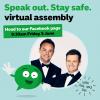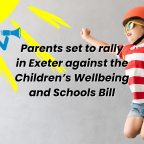
SW school pupils urged to join NSPCC virtual assembly with guest hosts Ant & Dec and David Walliams
The NSPCC is moving its schools’ assembly series ‘Speak Out. Stay Safe’ online, to continue its vital work helping children to stay safe from abuse and neglect.
The special broadcast on Friday morning will be hosted by Ant & Dec, with a helping hand from David Walliams, and deals with some of the additional worries that children are experiencing due to the COVID-19 pandemic.
Since January the NSPCC’s Childline service has delivered 6,938 counselling sessions to children and young people impacted by coronavirus.
Also, during seven weeks of lockdown (23 March – 10 May), the charity carried out 2,593 counselling sessions with children who shared concerns about abuse or neglect - on average 370 every week – an increase of approximately 60 more per week than in the months leading up to lockdown.
The digital assembly demonstrated a real lockdown effort from the contributors and aims to equip children with the knowledge and understanding they need to help them stay safe from abuse and neglect.
As part of the assembly, the NSPCC’s School’s Team will run a brand-new session adapted to address the challenges children are facing during the crisis.
It will culminate in a Q&A with Vicky Ford MP, Minister for Children and Families.
Children have asked questions around what to do if their family argues all the time; whether they should be tested for coronavirus before returning to school and what to do if they can’t concentrate on their schoolwork at home.
Minister for Children and Families Vicky Ford said: “Coronavirus is the biggest challenge we have faced in a long time. That’s why we have all had to make big changes, like staying at home, not seeing family and friends in person, and lots of children not attending school as normal.
"Thanks to all the changes children and their families have made over the last few months, we have come a long way in fighting the virus, and more children are now returning to school. But we all still have an important role to play, so everyone must stay alert and follow the rules to protect ourselves and other people."
In the average primary school class, at least two children have suffered from abuse or neglect. That’s why the NSPCC visits primary schools across the UK and Channel Islands to give children the knowledge they need to help them stay safe from harm and to speak out if they’re worried.
Hosts Ant & Dec, who’ve been supporting the NSPCC for many years said:
Ant: “It’s great fun to be able to host the NSPCC’s virtual assembly for children and their families, especially as this one carries such an important message – that every child can turn to someone when times are tough.”
Dec: “We believe it’s vitally important that all children know what to do if they have any concerns, particularly now, and we feel very honoured to be supporting the NSPCC with this.”
In 2019/20, the NSPCC Schools Service visited almost 450 primary schools across the South West of England, reaching over 80,000 children in the region.
Children are taught to speak out if they are worried, either to a trusted adult or Childline. Trained NSPCC volunteers and staff deliver an assembly and workshop with the help of Speak. out Stay safe mascot, Buddy the speech bubble.
Schools Service Manager for the South West of England, Candia Crosfield said: “Primary schools play an essential role in keeping our children safe. This is because they are in a strong position to identify signs of abuse and neglect, and also offer a secure space to teach children about staying safe and, if necessary, speaking out.
“However, due to the pandemic we have been unable to go into schools so by hosting a virtual assembly we can reach even more children during lockdown to let them know who to turn to for help.”
Speak Out. Stay Safe assemblies have taken place in more than 90% of all primary schools across the UK. They help to reinforce key lessons about abuse and neglect that are compulsory for all primary schools.
A recording of the assembly will be available on the NSPCC’s website and YouTube Channel after the event for anyone who misses it.
Adults concerned about a child can contact the NSPCC helpline seven days a week on 0808 800 5000, or email help@nspcc.org.uk. Children can call Childline on 0800 11 11 or visit www.childline.org.uk any time of the day or night.











